|
|
|
Sort Order |
|
|
|
Items / Page
|
|
|
|
|
|
|
| Srl | Item |
| 1 |
ID:
143474


|
|
|
|
|
| Publication |
Massachusetts, Center for International Studies, 1980.
|
| Description |
67p.pbk
|
|
|
|
|
|
|
|
|
|
|
|
Copies: C:1/I:0,R:0,Q:0
Circulation
| Accession# | Call# | Current Location | Status | Policy | Location |
| 023133 | 330.95195/GRI 023133 | Main | On Shelf | General | |
|
|
|
|
| 2 |
ID:
119660
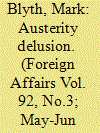

|
|
|
|
|
| Publication |
2013.
|
| Summary/Abstract |
The results of Europe's experiment with austerity are in and they're clear: it doesn't work. Here's how such a flawed idea became the West's default response to financial crises.
|
|
|
|
|
|
|
|
|
|
|
|
|
|
|
|
| 3 |
ID:
075643
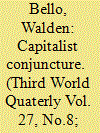

|
|
|
|
|
| Publication |
2006.
|
| Summary/Abstract |
This article argues that the key crisis that has overtaken today's global economy is the classical capitalist crisis of over-accumulation. Reaganism and structural adjustment were efforts to overcome this crisis in the 1980s, with little success, followed by globalisation in the 1990s. The Clinton administration embraced globalisation as the 'Grand Strategy' of the USA, its two key prongs being the accelerated integration of markets and production by transnational corporations and the creation of a multilateral system of global governance, the pillars of which were the World Trade Organization, the International Monetary Fund and the World Bank. The goal of creating a functionally integrated global economy, however, stalled, and the multilateral system began to unravel, thanks among other things to the multiple crises created by the globalisation of finance, which was the main trend of the period. In response partly to these crises, partly to increasing competition with traditionally subservient centre economies, and partly to political resistance in the South, Washington under the Bush administration has retreated from the globalist project, adopting a nationalist strategy consisting of disciplining the South through unilateralist military adventures, reverting to methods of primitive accumulation in exploiting the developing world, and making other centre economies bear the brunt of global adjustments necessitated by the crisis of over-accumulation.
|
|
|
|
|
|
|
|
|
|
|
|
|
|
|
|
| 4 |
ID:
140078
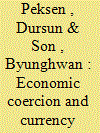

|
|
|
|
|
| Summary/Abstract |
Despite significant research on the efficacy and inadvertent humanitarian and political effects of economic sanctions, surprisingly little is known about the possible economic and financial consequences of sanctions for target economies. Synthesizing insights from the currency crisis literature with sanctions scholarship, we argue that economic sanctions are likely to trigger currency collapses, a major form of financial crisis that impedes economic growth and prosperity. We assert that economic coercion instigates currency crises by weakening the economy and creating political risks conducive to speculative attacks by currency traders. To substantiate the theoretical claims, we use time-series cross-national data for the 1970–2005 period. The results from the data analysis lend support for the hypothesis that sanctions undermine the financial stability of target countries. The findings also indicate that the adverse effect of economic coercion on the financial stability of target economies is likely to be conditioned by the severity of the coercion and the type of actors involved in the implementation of sanctions. The findings of this article add to the sanctions literature demonstrating how economic coercion could be detrimental to the target economy beyond the immediate effect on trade and investment. It also complements and adds to the literature on political economy of currency crises that has so far overlooked the significant role that economic coercion plays in financial crises.
|
|
|
|
|
|
|
|
|
|
|
|
|
|
|
|
| 5 |
ID:
157832
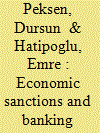

|
|
|
|
|
| Summary/Abstract |
What effect do economic sanctions have on the stability of banking systems in targeted economies? This manuscript advances the hypothesis that economic sanctions increase the likelihood of systematic banking crises by deteriorating the target economy’s macroeconomic conditions and limiting its access to international capital. To test the argument, we gathered data for over 125 emerging economies for the years from 1970 to 2005. The findings indicate that sanctions are likely to raise the probability of banking crises. The results also show that financial sanctions are more detrimental to the stability of banking systems than trade sanctions. Further, we find that the hypothesized effect of sanctions is conditioned by the extent of economic cost inflicted on targeted economies. One major implication of the findings is that sanctions, as external shocks, can potentially destabilize the financial stability of target countries in addition to the well-documented adverse effects on economic growth, political stability, and humanitarian conditions.
|
|
|
|
|
|
|
|
|
|
|
|
|
|
|
|
| 6 |
ID:
113156


|
|
|
|
|
| Publication |
2012.
|
| Summary/Abstract |
During the five years from 2003 to 2007, global perceptions of risk were unusually low, as reflected in the market pricing of sovereign debt, corporate debt and options. These perceptions were wrong, as the ensuing five years have abundantly illustrated. Today, in 2012, nobody doubts that the world faces many serious economic and political risks
|
|
|
|
|
|
|
|
|
|
|
|
|
|
|
|
| 7 |
ID:
165158
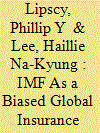

|
|
|
|
|
| Summary/Abstract |
A large literature has established that the International Monetary Fund (IMF) is heavily politicized. We argue that this politicization has important consequences for international reserve accumulation and financial crises. The IMF generates moral hazard asymmetrically, reducing the expected costs of risky lending and policies for states that are politically influential vis-à-vis the institution. Using a panel data set covering 1980 to 2010, we show that proxies for political influence over the IMF are associated with outcomes indicative of moral hazard: lower international reserves and more frequent financial crises. We support our causal claims by applying the synthetic control method to Taiwan, which was expelled from the IMF in 1980. Consistent with our predictions, Taiwan's expulsion led to a sharp increase in precautionary international reserves and exceptionally conservative financial policies.
|
|
|
|
|
|
|
|
|
|
|
|
|
|
|
|
| 8 |
ID:
172368


|
|
|
|
|
| Summary/Abstract |
Indonesia fielded shocks due to the Asian Financial Crisis (AFC) and the Global Financial Crisis (GFC) quite differently. Financial contagion, policy misdirection, panic and political upheaval saw the AFC bring economic collapse. The GFC, however, brought about real domestic growth of 6.1 per cent (2008) and 4.5 per cent (2009)—amongst the world’s best performances at the time. This paper reviews these events and employs numerical modelling of stylized AFC and GFC shocks to show that some of the contrast stems from differences in the shocks and intervening changes in Indonesia’s economic structure. Critically, IMF conditionality during the AFC required unsustainably contractionary reforms. Capital flight elements were present in both crises, however, and exchange rate depreciations and money-financed fiscal expansions are shown to have contributed significantly to resolution.
|
|
|
|
|
|
|
|
|
|
|
|
|
|
|
|
| 9 |
ID:
092146


|
|
|
|
|
| Publication |
2009.
|
| Summary/Abstract |
In the face of the global economic crisis of 2008-09, Japan has played a positive role in helping to stabilize the regional and global financial systems. Among the positive actions it has taken have been large-scale fiscal and monetary stimulus at home, an unprecedentedly large loan to the International Monetary Fund, liquidity support to South Korea, and a proactive role in G-20 discussions. However, regional arrangements such as the Chiang Mai Initiative have been of minimal importance in preventing financial crises in East Asia. Japan can continue to demonstrate leadership in promoting regional economies and financial systems by expanding its current activities, while ensuring that regional arrangements continue to support global ones.
|
|
|
|
|
|
|
|
|
|
|
|
|
|
|
|
| 10 |
ID:
073564
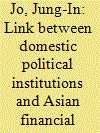

|
|
|
|
|
| Publication |
2006.
|
| Summary/Abstract |
Political factors are rarely systematically studied as a condition triggering a financial crisis. Although such factors have been hypothesized to influence states to implement structural adjustment policies, the systematic link between political conditions and economic crises is still poorly understood. This study claims that the causes of crises cannot be attributed solely to market forces; they may be the consequence of different political institutions. The findings demonstrate that regime types matter in the timing of financial crisis. As well, the low level of democracy in Asia does not facilitate the duration of economic stability. Rather, these countries are more prone to a financial crisis.
|
|
|
|
|
|
|
|
|
|
|
|
|
|
|
|
| 11 |
ID:
165431
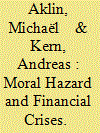

|
|
|
|
|
| Summary/Abstract |
Do international lenders of last resort create financial instability by generating moral hazard? The evidence is thin and plagued with measurement error. We use the number of American troops hosted by third countries to measure the strength of American commitment to ensuring the countries’ economic health. We test several hypotheses against a dataset covering about sixty-eight countries between 1960 and 2009. Using evidence from fixed-effects and instrumental-variable models, we find that increasing the number of US troops by one standard deviation above the mean raises the probability of a financial crisis in the host country by up to 13 percentage points. We also investigate the channels through which moral hazard materializes. Countries with more US troops conduct more expansionary fiscal and monetary policies, implement riskier financial regulations, and receive more capital, especially from US banks. While many scholars of international relations view the American overseas military presence as a source of stability, we identify an underexplored mechanism by which it generates instability.
|
|
|
|
|
|
|
|
|
|
|
|
|
|
|
|
| 12 |
ID:
171164


|
|
|
|
|
| Summary/Abstract |
IMF loans during times of financial crisis often occur in conjunction with bilateral financial rescues. These bilateral bailouts are substantial in size and a central component of international cooperation during financial crises. We analyze the political economy of bilateral bailouts and study the trade-offs that potential creditor governments experience when other countries find themselves in financial distress. Creditor governments want to stabilize crisis countries by providing additional liquidity, particularly if the crisis country is economically or politically important to them, but they are constrained by domestic politics. Politicians aim to balance these countervailing pressures. They provide bailouts when their own economy is exposed to negative spillover effects and when the crisis country is important for geostrategic, military, or political reasons. Domestic economic and political constraints, on the other hand, limit their ability to bail out other countries. We test our hypotheses using an original data set on bilateral bailouts by the G7 countries to countries that experienced financial crises between 1975 and 2010. The findings of our statistical analysis support our theoretical argument and contribute to a deeper understanding of international cooperation's complex structure during financial crises.
|
|
|
|
|
|
|
|
|
|
|
|
|
|
|
|
| 13 |
ID:
158719


|
|
|
|
|
| Summary/Abstract |
This article critically examines recent works on resilience. In so doing, it argues that rather than representing some radical rupture with current practices heralding the dawn of a new era, as David Chandler claims, the emphasis on individuals as resilient subjects simply represents a new phase in the neoliberal shift from the state as provider to state as enabler and promoter of self-reliance. Indeed, our present preoccupation with complexity, uncertainty, and resilience can best be understood as reflecting the consequences of neoliberal policies Moreover, the article further argues that there is an attendant danger that resilience thinking may further promote neoliberal forms of governmentality and encourage a degree of political passivity. The emphasis on resilience is in danger of depoliticising highly political choices, shifting attention toward ex-post policies of survival and recovery rather than challenging the current economic order and resisting the further imposition of neoliberal policies on already beleaguered populations. This article therefore argues for shifting our emphasis towards a Foucauldian analysis of power and resistance.
|
|
|
|
|
|
|
|
|
|
|
|
|
|
|
|
| 14 |
ID:
129283


|
|
|
|
|
| Publication |
2012.
|
| Summary/Abstract |
The article presents a speech by Chinese President Hu Jintao, delivered at the General Meeting in China on December 20, 2009, in which he discussed the celebration of the 10th anniversary of the return of Macau, China to the country, financial crisis, and the severe acute respiratory syndrome (SARS) epidemic.
|
|
|
|
|
|
|
|
|
|
|
|
|
|
|
|
|
|
|
|
|